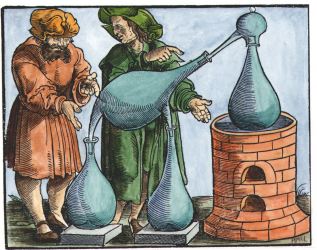| Author | Post |
|---|
Carolyn Dougherty
Member

|
Posted: Tue Sep 4th, 2012 11:15 pm |
|
I plan to post a link to it when it's done, but now that I've identified a conference to present it at that probably won't be for nearly a year.
|
Mike Zuber
Member
|
Posted: Fri Oct 5th, 2012 06:46 pm |
|
This topic reminded me of a very poignant discussion of this requirement that I came across quite a while ago and that I've just retrieved again: in Diederich Wessel Linden, Gründliche Chemische Anmerkungen ... über des Herrn von Welling Opus mago-cabbalisticum, und was von dessen Verbesserung der Metalle zu halten sey (Amsterdam and Leipzig, 1746; digitized by SUB Göttingen, http://resolver.sub.uni-goettingen.de/purl?PPN626367492), pp. 60-64, the notion that alchemy is somehow intricately connected to theology is rejected and the idea that the alchemist ought to be holy and virtuous is poked fun at. Part of the argument runs like this: why on earth would God suddenly change the regular course of nature just to put off a poor, sinful alchemist?
This treatise was supposedly translated from the English (see title page) but I wasn't able to identify the original at the time. The author's name has an English ring to it (think Theodore Wesley Linden, maybe?), so if anyone can come up with a suggestion, that'd be much appreciated.
Of course, since Georg von Welling is chastised for voicing such silly notions, you might want to look into his Opus mago-cabbalisticum as well (http://digital.slub-dresden.de/id330289020).
|
Paul Ferguson
Member

| Joined: | Fri Feb 15th, 2008 |
| Location: | |
| Posts: | 1538 |
| Status: |
Offline
|
|
Posted: Fri Oct 5th, 2012 08:26 pm |
|
Mike Zuber wrote:
This topic reminded me of a very poignant discussion of this requirement that I came across quite a while ago and that I've just retrieved again: in Diederich Wessel Linden, Gründliche Chemische Anmerkungen ... über des Herrn von Welling Opus mago-cabbalisticum, und was von dessen Verbesserung der Metalle zu halten sey (Amsterdam and Leipzig, 1746; digitized by SUB Göttingen, http://resolver.sub.uni-goettingen.de/purl?PPN626367492), pp. 60-64, the notion that alchemy is somehow intricately connected to theology is rejected and the idea that the alchemist ought to be holy and virtuous is poked fun at. Part of the argument runs like this: why on earth would God suddenly change the regular course of nature just to put off a poor, sinful alchemist?
This treatise was supposedly translated from the English (see title page) but I wasn't able to identify the original at the time. The author's name has an English ring to it (think Theodore Wesley Linden, maybe?), so if anyone can come up with a suggestion, that'd be much appreciated.
Of course, since Georg von Welling is chastised for voicing such silly notions, you might want to look into his Opus mago-cabbalisticum as well (http://digital.slub-dresden.de/id330289020).
Hi Mike,
He was better known as Diederick Wessel Linden it would seem, and Googling for that name gives quite a few hits. Immortalised by Smollett in "Humphrey Clinker".
Something about him here:
http://thequackdoctor.com/index.php/the-etherial-oil-of-mustard-for-the-gout/
The reference to him in Smollett is in the letter of April 18:
"I was t'other day much diverted with a conversation that passed in the Pump-room, betwixt him and the famous Dr L—n, who is come to ply at the Well for patients. My uncle was complaining of the stink, occasioned by the vast quantity of mud and slime which the river leaves at low ebb under the windows of the Pumproom. He observed, that the exhalations arising from such a nuisance, could not but be prejudicial to the weak lungs of many consumptive patients, who came to drink the water. The Doctor overhearing this remark, made up to him, and assured him he was mistaken. He said, people in general were so misled by vulgar prejudices that philosophy was hardly sufficient to undeceive them. Then humming thrice, he assumed a most ridiculous solemnity of aspect, and entered into a learned investigation of the nature of stink. He observed, that stink, or stench, meant no more than a strong impression on the olfactory nerves; and might be applied to substances of the most opposite qualities; that in the Dutch language, stinken signifies the most agreeable perfume, as well as the most fetid odour, as appears in Van Vloudel's translation of Horace, in that beautiful ode, Quis multa gracilis, &c."Attached Image (viewed 347 times):
 Last edited on Fri Oct 5th, 2012 08:40 pm by Paul Ferguson
|
Carolyn Dougherty
Member

|
Posted: Thu Nov 29th, 2012 08:59 am |
|
Belated thanks Mike and Paul--Linden definitely deserves a mention in my proposed paper. Just submitted the proposal today:
In this paper I consider how alchemists, early modern natural philosophers, contemporary scientists, and the established Church (Roman Catholic and Anglican) express the relationship between such personal character traits as purity and good intent and the efficacy of an individual’s experiments or actions. Both Catholic and Anglican doctrine explicitly state that the efficacy of a sacrament does not depend on the personal attributes of the priest who performs it; this doctrine contrasts with the writings of many early modern alchemists and natural philosophers who argue that the success of an experiment or the efficacy of an action depend at least in part on the personal characteristics of the experimenter or actor.
In this respect, the contemporary description of the scientific method is more consistent with the view of the Church than with that of early modern natural philosophers. Similarities between the views of the Church and of the modern scientific establishment appear to arise
from similarity in institutional structures, the role of individuals within large and complex organisations, and understanding of the relationship between the individual and the institution; in this respect the established Church and the modern scientific establishment have more in common with each other than with the early modern network of researchers that we traditionally consider the predecessor of the modern scientific establishment.
A consideration of these differing views of the effect of personal traits on experimental efficacy can help us develop a better understanding of how we have come to differentiate between ‘arts’ and ‘sciences’, the distinctive nature of craft knowledge, and the relationship between employer and employee in capitalist economies.
Cross your fingers!
|
Mike Zuber
Member
|
Posted: Thu Nov 29th, 2012 07:53 pm |
|
This sounds very interesting, and it's now my turn to say thanks--you inadvertently gave me an important clue. Though you don't mention the Lutheran church, it also held that the moral qualities of the priest did not affect the eucharist. Part of the background to this was the lack of a distinction between lived 'faith' and orthodox 'belief.' There were, however, some groups within Lutheranism (Schwenckfelders, Weigelians or spiritualists, separatist Pietists--all of them rejected by the establishment) that made this distinction and stressed conversion experiences and, consequently, the need for ministers to practise what they preached. In the long term I'll be trying to argue that alchemy was especially prominent among those groups, which absolutely ties in with the notion of the experimenter affecting the outcome of the experiment, or alchemical success as a divine gift for the truly faithful.
Best of luck with the proposal!
|
Carolyn Dougherty
Member

|
Posted: Thu Nov 29th, 2012 08:13 pm |
|
 yes exactly! I'm glad my thought process is contributing to yours. An Anglican clergyman suggested that the difference between these notions in the Catholic/Anglican churches and the Protestant/dissenting sects may have to do with the fact that in the former the role of the clergy is to celebrate sacraments and perform the rituals that 'bring God to earth', while in the latter, since there is no necessity for the church itself to intercede with God, the clergy's role is more to preach, convert, and serve as an example to the congregation. yes exactly! I'm glad my thought process is contributing to yours. An Anglican clergyman suggested that the difference between these notions in the Catholic/Anglican churches and the Protestant/dissenting sects may have to do with the fact that in the former the role of the clergy is to celebrate sacraments and perform the rituals that 'bring God to earth', while in the latter, since there is no necessity for the church itself to intercede with God, the clergy's role is more to preach, convert, and serve as an example to the congregation.
|
Paul Ferguson
Member

| Joined: | Fri Feb 15th, 2008 |
| Location: | |
| Posts: | 1538 |
| Status: |
Offline
|
|
Posted: Mon Dec 3rd, 2012 01:50 am |
|
I'm currently reading Sabine Stuart's 'Discours Philosophique'. On page 62-3 of the second volume she says:
"In past centuries the confidence of one's friends, who were very different to those of today, was total, because good faith prevailed and this useful science [alchemy] was in all its lustre and you could communicate it to your friends quite openly. But now that the wickedest perfidy has chased good faith from its throne, he who is instructed in alchemy is often compelled to weave and dodge to avoid the ambushes of his enemies and his inevitable self-destruction. Yes, he is compelled to keep silent about the useful knowledge that he could communicate. In this way society is often deprived of great illumination. Nowadays therefore we can only master this science through the inspiration of almighty God. That is why he who loves Him with all his heart and fears Him must not despair of ever finding it, if he searches for it diligently, because it is easier to obtain it from almighty God than from wise men who, with good reason, fear the perfidy of the wicked..."
which I take to mean that the blocking-off of conventional secular alchemical learning-networks by a combination of religious intolerance and professional jealousy forced alchemists to become righteous mystics, possibly against their inclinations.
Maybe this has some bearing on your topic which I wish you great success with?
See:
http://www.e-rara.ch/zut/collections/content/pageview/3290817
|
Carolyn Dougherty
Member

|
Posted: Wed Dec 5th, 2012 08:36 am |
|
| Thanks! Interesting perspective...the mention of 'past centuries' implies that she herself didn't have any personal experience of this open and secular alchemical world, which may not really have existed, though I guess we do have some intimations that the concepts of alchemy were more 'mainstream' at other times and in other places than in Renaissance and early modern Europe. But from the little I know about the alchemists I'm writing about it seems more the other way around; most of those motivated at that time to pursue alchemical work were already religious nonconformists and 'righteous mystics' (though there are obviously exceptions who poorly fit that profile, like Boyle).
|
Carolyn Dougherty
Member

|
Posted: Thu Feb 7th, 2013 07:01 am |
|
| Quick update--the paper for which I'd posted the original question has been accepted for http://www.ichstm2013.com/, to be held in Manchester in late July--so now I'll be undertaking the writing in earnest, and will let youall know how it turns out.
|
Paul Ferguson
Member

| Joined: | Fri Feb 15th, 2008 |
| Location: | |
| Posts: | 1538 |
| Status: |
Offline
|
|
Posted: Thu Feb 7th, 2013 07:26 am |
|
Carolyn Dougherty wrote:
Quick update--the paper for which I'd posted the original question has been accepted for http://www.ichstm2013.com/, to be held in Manchester in late July--so now I'll be undertaking the writing in earnest, and will let youall know how it turns out.
Link doesn't work because of the comma. Try this:
http://www.ichstm2013.com/
...and best of luck with the paper 
|
Carolyn Dougherty
Member

|
Posted: Thu Feb 7th, 2013 07:39 am |
|
| Thanks for the tech fix, and the good wishes!
|

Current time is 09:33 am | Page:   1 2 1 2 |
|
|
|

